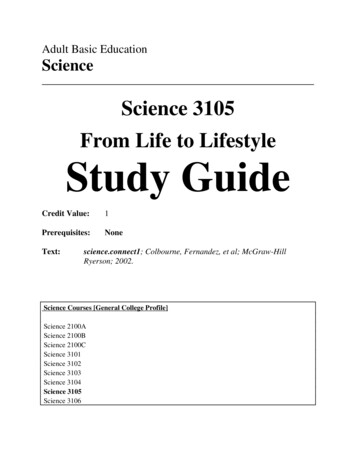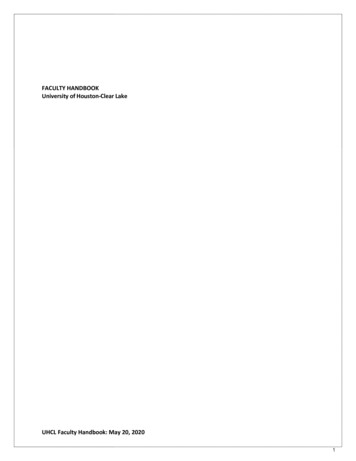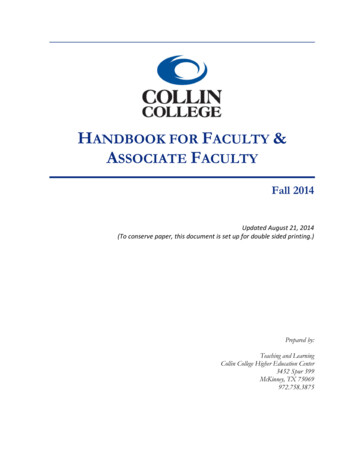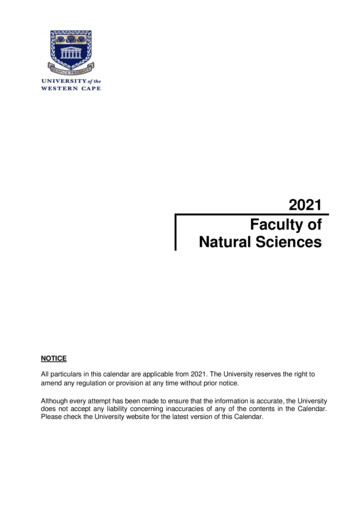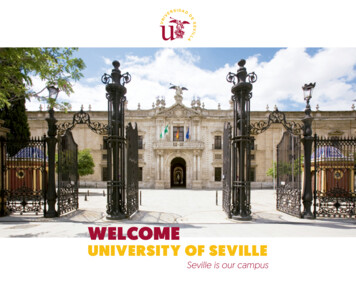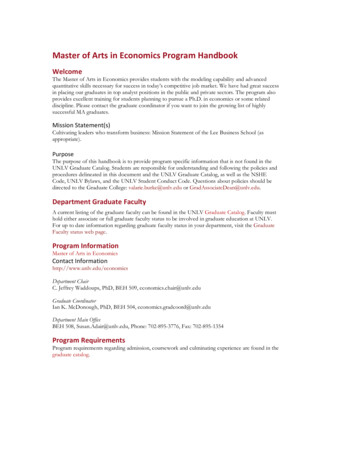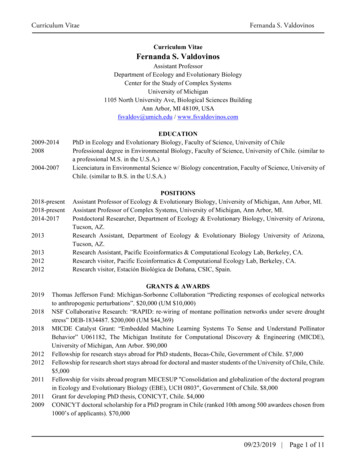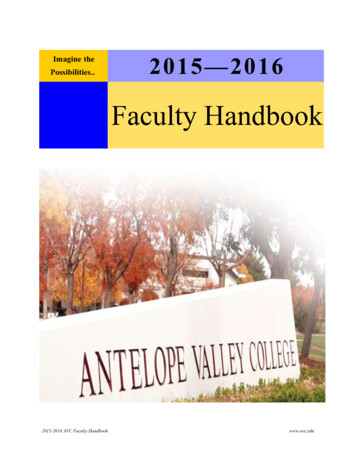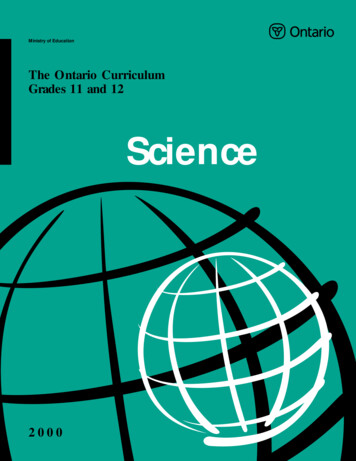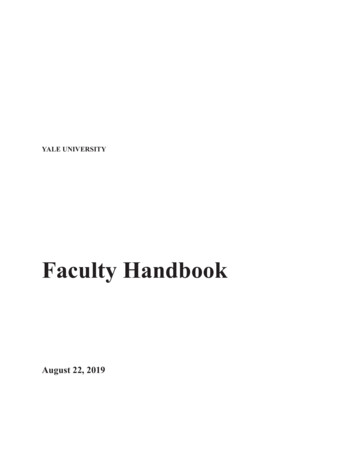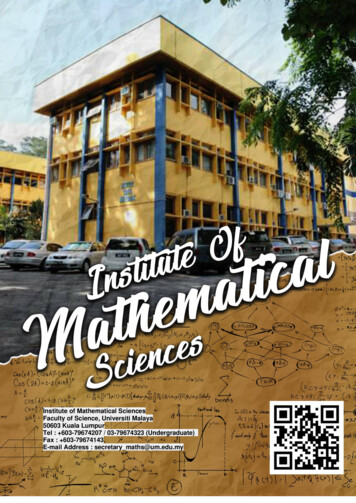
Transcription
Institute of Mathematical SciencesFaculty of Science, Universiti Malaya50603 Kuala LumpurTel : 603-79674207 / 03-79674323 (Undergraduate)Fax : 603-79674143E-mail Address : secretary maths@um.edu.my1
Faculty of Science Handbook, Academic Session 2021/2022BACHELOR OF SCIENCE IN MATHEMATICSACADEMIC SESSION 2021/2022(134 CREDITS)1. UNIVERSITY COURSES (12 CREDITS)COURSE CODECOURSE NAMEPRE-REQUISITEGLTxxxxEnglish Courses (subject to MUET bands)GKA/GKI/GKK/Co-curriculumGKP/GKS/GKUGIG1012 /Philosophy and Current Issues /GLT1017Basic Malay Language (only for internationalstudents)GIG1013Appreciation of Ethics and CivilisationsGIG1003Basic Entrepreneurship Culture2. CORE COURSES (79 CREDITS)COURSE CODECOURSE NAMEPRE-REQUISITELEVEL 1 (30 Credits)SIX1015Science, Technology and SocietySIX1016StatisticsSIM1001Basic MathematicsSIM1002Calculus ISIM1003Calculus IISIM1002SIM1004Fundamentals of ComputingSIM1005Fundamentals of SpreadsheetsSIM1006Ordinary Differential EquationsSIM1002SIT1001Probability and Statistics ISIM1002LEVEL 2 (41 Credits)SIM2001Advanced CalculusSIM1003SIM2002Linear AlgebraSIM1001SIM2007Appreciation of MathematicsSIM1003SIM2010Numerical ComputationSIM1003SIM2011Structured ProgrammingSIM1002SIM2012Basic Operations ResearchSIM1001SIM2013Introduction to CombinatoricsSIM1001SIM2014Algebra ISIM1001SIM2015Introduction to AnalysisSIM1003SIM2016Complex VariablesSIM1003SIM2018Partial Differential EquationsSIM1006SIT2007Foundations of Data ScienceSIT1001LEVEL 3 (8 Credits)SIM3020Industrial TrainingSIM20073. ELECTIVE COURSES (43 CREDITS)(I) STUDENT HOLISTIC EMPOWERMENT (8 CREDITS)‡ ONE COMPULSORY course is taken from each cluster.CLUSTERCLUSTER 1Thinking Matters: Mind and IntellectCLUSTER 2Emotional, Physical and Spiritual Intelligence: Heart, Body and SoulCLUSTER 3Technology/Artificial Intelligence and Data Analytics: I-techieCLUSTER 4Global Issues and Community Sustainability: Making the World a Better Place(II) PROGRAM ELECTIVE COURSES (at least 35 CREDITS)MATHEMATICAL SCIENCECOURSE CODECOURSE ems of Ordinary Differential EquationsSIM1006SIM2021Optimization TechniquesSIM2001SIM3001Graph TheorySIM2013SIM3002Combinatorial MathematicsSIM2013SIM3003Number TheorySIM2002SIM3004Advanced Linear AlgebraSIM2002SIM3005Matrix TheorySIM2002SIM3006Algebra IISIM2014SIM3007Ring TheorySIM2014SIM3008Group TheorySIM2014SIM3009Differential 4444444444
Faculty of Science Handbook, Academic Session 1SIQ2002SIQ2003SIT2001COURSE 01SIQ2002SIT2001SIT2010SIT3005Complex AnalysisReal AnalysisMathematical Science ProjectCryptographyIntroduction to AccountingMicroeconomicsMacroeconomicsFinancial Mathematics and DerivativesProbability and Statistics IIAPPLIED MATHEMATICSCOURSE NAMESystems of Ordinary Differential EquationsManagement MathematicsOptimization TechniquesMathematical Science ProjectCryptographyNumerical Methods and AnalysisComputational GeometryScientific ComputingProduction and Inventory ControlMathematical ProgrammingIndustrial Operations ResearchComputational Fluid DynamicsDynamical Systems TheoryMicroeconomicsMacroeconomicsProbability and Statistics IIStochastic ProcessesTimes Series and Forecasting MethodsSIM2016SIM2015SIM2011SIT1001 and SIM1002SIM2001SIM2011SIT1001 and SIM2011SIM2010SIM2011SIM2011SIM2012 and IT2001CREDITS444444444444333434Students who wish to take SIM3020 are advised to have passed at least 90 credits of the listed courses in the program.3
Faculty of Science Handbook, Academic Session 2021/2022PROGRAM GOALTo produce graduates with a sound knowledge of mathematics, capable of analysing and solvingproblems and thinking critically, able to adapt to diverse environments and contribute significantly invarious professions.PROGRAM EDUCATIONAL OBJECTIVES1.2.3.Graduates are able to work in professions related to mathematical sciences or related fields.Graduates are able to practice continuous learning in their careers.Graduates are able to communicate and leverage learned concepts/methods effectively andethically.PROGRAM LEARNING OUTCOMESAt the end of the program, graduates with Bachelor of Science in Mathematics are able to:1.2.3.4.5.6.7.8.Explain the principles and concepts of mathematics.Demonstrate the ability to apply mathematical knowledge critically and analytically in relatedfield.Apply the principles of mathematics in solving mathematical and real-world problems.Communicate mathematical concepts effectively, accurately and coherently in written and oralforms.Use suitable information, graphical and computational strategies in solving mathematicalproblems.Work independently and demonstrate leadership quality and sense of responsibility in achievinggoals and outcomes.Engage in lifelong learning to advance knowledge and applications of mathematics.Act professionally and ethically to solve practical problems in mathematical professions.4
Faculty of Science Handbook, Academic Session 2021/2022LIST OF COURSES ACCORDING TO SEMESTER(PLANNING OF COURSES)BACHELOR OF SCIENCE IN MATHEMATICSYEAR 1COMPONENTSEMESTER 1COURSECREDITxxxxGLTEnglish Courses (subject toMUET bands)TOTALCREDITSSEMESTER 2COURSECREDITxxxx2GLTEnglish Courses (subject toMUET bands)GIG1012 / GLT1017*Philosophy and Current Issues/ Basic Malay Language*2GIG1013Appreciation of Ethics andCivilisations2SIX1016Statistics3SIX1015Science, Technology andSociety2SIM1001Basic Mathematics4SIT1001Probability and Statistics I4SIM1002Calculus I4SIM1003Calculus II4SIM1004Fundamentals of Computing3SIM1005Fundamentals ofSpreadsheets22Student HolisticEmpowerment (SHE)Cluster 2: Emotional,Physical and SpiritualIntelligence: Heart, Bodyand Soul22University CoursesCore CoursesElective Courses8Student Holistic Empowerment(SHE)Cluster 1: Thinking Matters:Mind and IntellectTOTAL CREDITS262041838*only for international studentsYEAR 2COMPONENTSEMESTER 1COURSEGIG1003Basic EntrepreneurshipCultureTOTALCREDITSSEMESTER 2CREDITCOURSECREDIT2University CoursesCore CoursesElective CoursesTOTAL 06Ordinary Differential Equations4SIT2007Foundations of DataScience3SIM2001Advanced Calculus4SIM2015Introduction to Analysis3SIM2002Linear Algebra4SIM2016Complex Variables3SIM2007Appreciation of Mathematics2SIM2010Numerical Computation4SIM2011Structured Programming4Student Holistic Empowerment(SHE)Cluster 3: Technology/ArtificialIntelligence and DataAnalytics: I-techie2205Student HolisticEmpowerment (SHE)Cluster 4: Global Issues andCommunity Sustainability:Making the World a BetterPlace31421939
Faculty of Science Handbook, Academic Session 2021/2022YEAR 3COMPONENTSEMESTER 1TOTALCREDITSSEMESTER 2COURSECREDITSIM2013Introduction to Combinatorics3SIM2014Algebra I3COURSECREDIT14Core CoursesSIM2012Basic Operations Research4SIM2018Partial Differential Equations4Elective Course 14Elective Course 24Elective Course 34Elective Course 44Elective Course 54Elective Courses20TOTAL CREDITS181634YEAR 4COMPONENTSEMESTER 1COURSECore CoursesTOTALCREDITSSEMESTER 2CREDITSIM3020Industrial TrainingCOURSECREDIT88Elective Course 64Elective Course 74Elective Courses15TOTAL CREDITS86Elective Course 84Elective Course 931523
Faculty of Science Handbook, Academic Session 2021/2022BACHELOR OF SCIENCE IN STATISTICSACADEMIC SESSION 2021/2022(134 CREDITS)1. UNIVERSITY COURSES (12 CREDITS)COURSE CODECOURSE NAMEPRE-REQUISITEGLTxxxxEnglish Courses (subject to MUET bands)GKA/GKI/GKK/Co-curriculumGKP/GKS/GKUGIG1012 /Philosophy and Current Issues /GLT1017Basic Malay Language (only for internationalstudents)GIG1013Appreciation of Ethics and CivilisationsGIG1003Basic Entrepreneurship Culture2. CORE COURSES (76 CREDITS)COURSE CODECOURSE NAMEPRE-REQUISITELEVEL 1 (26 Credits)SIX1015Science, Technology and SocietySIM1001Basic MathematicsSIM1002Calculus ISIM1003Calculus IISIM1002SIT1001Probability and Statistics ISIM1002SIT1002Statistical ProgrammingSIT1003Analysis of Data and Statistical Report WritingLEVEL 2 (28 Credits)SIM2001Advanced CalculusSIM1003SIM2002Linear AlgebraSIM1001SIT2001Probability and Statistics IISIT1001SIT2007Foundations of Data ScienceSIT1001SIT2008Further Mathematical StatisticsSIT2001SIT2009Regression AnalysisSIT1001SIT2010Stochastic ProcessesSIT2001SIT2011Statistics and CommunitySIT1003LEVEL 3 (22 Credits)SIT3005Time Series and Forecasting MethodsSIT2001SIT3015Introduction to Multivariate AnalysisSIT2001SIT3016Generalized Linear ModelsSIT2001 and SIT2009SIT3017Statistical Learning and Data MiningSIT2007SIT3021Industrial TrainingSIT30173. ELECTIVE COURSES (46 CREDITS)(I) STUDENT HOLISTIC EMPOWERMENT (8 CREDITS)‡ ONE COMPULSORY course is taken from each cluster.CLUSTERCLUSTER 1Thinking Matters: Mind and IntellectCLUSTER 2Emotional, Physical and Spiritual Intelligence: Heart, Body and SoulCLUSTER 3Technology/Artificial Intelligence and Data Analytics: I-techieCLUSTER 4Global Issues and Community Sustainability: Making the World a Better Place(II) PROGRAM ELECTIVE COURSES (at least 38 CREDITS)COURSE CODECOURSE NAMEPRE-REQUISITESIM2010Numerical ComputationSIM1003SIM2012Basic Operations ResearchSIM1001SIQ1001Introduction to csSIQ2003Financial Mathematics and DerivativesSIM1002SIT3003Computer Intensive Methods in StatisticsSIT2001SIT3004Applied Stochastic ProcessesSIT2010SIT3008Introduction to Survey SamplingSIT2001SIT3009Statistical Process ControlSIT2001SIT3012Design and Analysis of ExperimentsSIT1001 and SIT2009SIT3013Analysis of Failure and Survival DataSIT2001SIT3018Non-Parametric StatisticsSIT1001SIT3019Introduction to Bayesian StatisticsSIT2001SIT3020Python for Data ScienceSIT3017SIT3022Probability TheorySIM2001 and DITS2222CREDITS4433344444444444
Faculty of Science Handbook, Academic Session 2021/2022SIT3023SIT3024SIT3025Statistical LaboratoryStatistical Consultancy and Data AnalysisStatistical Science ProjectSIT1002 and SIT2007SIT3021SIT1002 and SIT2007The exact number of program elective courses offered in each year may differ.8334
Faculty of Science Handbook, Academic Session 2021/2022PROGRAM GOALTo produce graduates who have sound knowledge in statistics and mathematics, strong problemsolving skills and capability to adapt to diverse environment, with life-long learning habits.PROGRAM EDUCATIONAL OBJECTIVESTo produce:1. Graduates who work in a profession directly related to statistics or any other related field;2. Graduates who are involved in continuous learning in statistics or other related fields;3. Graduates who are able to communicate statistical concepts and methods effectively and ethically.PROGRAM LEARNING OUTCOMESAt the end of the program, graduates with Bachelor of Science in Statistics are able to:1.2.3.4.5.6.7.8.Explain the principles and concepts of statistics and mathematics as the foundation for data-drivendecision-making;Demonstrate the ability to apply statistical and mathematical knowledge critically and analyticallyto complete a task;Apply the principles of statistics and mathematics in solving real world problems;Communicate statistical and mathematical concepts effectively, accurately and coherently inwritten and oral forms;Access, manage and process data effectively and efficiently using suitable graphical andcomputational strategies;Work in teams, and demonstrate leadership quality and sense of responsibility in achieving goalsand outcomes;Engage in life-long learning to advance knowledge and applications of statistics and mathematics;Act professionally and ethically in the course of analysis and decision-making to solve problems.9
Faculty of Science Handbook, Academic Session 2021/2022LIST OF COURSES ACCORDING TO SEMESTER(PLANNING OF COURSES)BACHELOR OF SCIENCE IN STATISTICSYEAR 1COMPONENTSEMESTER 1COURSECREDITXXXXGLTEnglish Courses (subject toMUET bands)TOTALCREDITSSEMESTER 2COURSECREDITXXXX2GLTEnglish Courses (subjectto MUET bands)GIG1012 / GLT1017*Philosophy and Current Issues/ Basic Malay Language*2GIG1013Appreciation of Ethics andCivilisations2SIT1002Statistical Programming4SIM1003Calculus II4SIM1001Basic Mathematics4SIT1001Probability and Statistics I4SIM1002Calculus I4SIT1003Analysis of Data andStatistical Report Writing4SIX1015Science, Technology andSociety22University CoursesCore CoursesElective Courses8Student Holistic Empowerment(SHE)Cluster 1: Thinking Matters:Mind and IntellectTOTAL CREDITS2622181836*only for international studentsYEAR 2COMPONENTSEMESTER 1COURSEUniversity CoursesCore CoursesElective CoursesTOTAL CREDITSTOTALCREDITSSEMESTER 2CREDITCOURSECREDITGIG1003Basic EntrepreneurshipCulture2SIM2001Advanced Calculus4SIT2008Further MathematicalStatistics4SIM2002Linear Algebra4SIT2010Stochastic Processes3SIT2001Probability and Statistics II4SIT2009Regression Analysis4SIT2007Foundations of Data Science3SIT3015Introduction to MultivariateAnalysis3SIT2011Statistics and Community2Student HolisticEmpowerment (SHE)Cluster 3:Technology/ArtificialIntelligence and DataAnalytics: I-techie2Elective Course 14Student Holistic Empowerment(SHE)Cluster 2: Emotional, Physicaland Spiritual Intelligence:Heart, Body and Soul2211023182041
Faculty of Science Handbook, Academic Session 2021/2022YEAR 3COMPONENTSEMESTER 1COURSEUniversity CoursesCore CoursesTOTALCREDITSSEMESTER 5Time Series and ForecastingMethods4SIT3016Generalized Linear Models4SIT3017Statistical Learning and DataMining3Elective Course 24COURSECREDIT2SIT3021Industrial Training8196Elective CoursesStudent Holistic Empowerment(SHE)Cluster 4: Global Issues andCommunity Sustainability:Making the World a BetterPlace2TOTAL CREDITS19827YEAR 4COMPONENTSEMESTER 1TOTALCREDITSSEMESTER 2COURSECREDITCOURSECREDITElective Course 34Elective Course 74Elective Course 44Elective Course 84Elective Course 54Elective Course 94Elective Course 63Elective Course 10330Elective CoursesTOTAL CREDITS15111530
Faculty of Science Handbook, Academic Session 2021/2022BACHELOR OF ACTUARIAL SCIENCEACADEMIC SESSION 2021/2022(145 CREDITS)1. UNIVERSITY COURSES (12 CREDITS)COURSE CODECOURSE NAMEPRE-REQUISITEGLTxxxxEnglish Courses (subject to MUET bands)GKA/GKI/GKK/Co-curriculumGKP/GKS/GKUGIG1012 /Philosophy and Current Issues /GLT1017Basic Malay Language (only for internationalstudents)GIG1013Appreciation of Ethics and CivilisationsGIG1003Basic Entrepreneurship Culture2. CORE COURSES (87 CREDITS)COURSE CODECOURSE NAMEPRE-REQUISITELEVEL 1 (24 Credits)SIX1015Science, Technology and SocietySIX1016StatisticsSIM1001Basic MathematicsSIM1002Calculus ISIM1003Calculus IISIM1002SIQ1001Introduction to AccountingSIT1001Probability and Statistics ISIM1002LEVEL 2 (31 Credits)SIM2001Advanced CalculusSIM1003SIM2002Linear AlgebraSIM1001SIM2007Appreciation of MathematicsSIM1003SIM2011Structured oeconomicsSIQ2003Financial Mathematics and DerivativesSIM1002SIT2001Probability and Statistics IISIT1001SIT2007Foundations of Data ScienceSIT1001LEVEL 3 (32 Credits)SIQ3001Actuarial Mathematics ISIQ2003SIQ3002Portfolio Theory and Asset ModelsSIQ2003SIQ3003Actuarial Mathematics IISIQ3001SIQ3004Mathematics of Financial DerivativesSIQ2003SIQ3005Life Insurance and TakafulSIQ3006Risk TheorySIT2001SIQ3007Industrial TrainingSIQ30013. ELECTIVE COURSES (46 CREDITS)(I) STUDENT HOLISTIC EMPOWERMENT (8 CREDITS)‡ ONE COMPULSORY course is taken from each cluster.CLUSTERCLUSTER 1Thinking Matters: Mind and IntellectCLUSTER 2Emotional, Physical and Spiritual Intelligence: Heart, Body and SoulCLUSTER 3Technology/Artificial Intelligence and Data Analytics: I-techieCLUSTER 4Global Issues and Community Sustainability: Making the World a Better Place(II) PROGRAM ELECTIVE COURSES (at least 38 CREDITS)COURSE CODECOURSE NAMEPRE-REQUISITESIM1004Fundamentals of ComputingSIM1005Fundamentals of SpreadsheetsSIM1006Ordinary Differential EquationsSIM1002SIM2010Numerical ComputationSIM1003SIM2012Basic Operations ResearchSIM1001SIM3021Mathematical Science ProjectSIM2011SIQ3008Foundation of Islamic FinanceSIQ3009Pension MathematicsSIQ3001SIQ3010Survival ModelsSIT2001SIQ3011Business FinanceSIQ3012Financial and Business ManagementSIQ3013Stochastic ModelsSIT2001SIT2008Further Mathematical 34434444448CREDITS2222CREDITS3244444443344
Faculty of Science Handbook, Academic Session ion AnalysisStochastic ProcessesComputer Intensive Methods in StatisticsApplied Stochastic ProcessesTime Series and Forecasting MethodsIntroduction to Multivariate AnalysisGeneralized Linear ModelsStatistical Learning and Data MiningNon-Parametric StatisticsIntroduction to Bayesian StatisticsPython for Data ScienceProbability T2001 and SIT2009SIT2007SIT1001SIT2001SIT3017SIM2001 and SIT2008434443434444Students who wish to take SIQ3007 are advised to have passed at least 110 credits of the listed courses in the program.13
Faculty of Science Handbook, Academic Session 2021/2022PROGRAM GOALTo produce graduates with sound knowledge in the actuarial field through exploration in the theoreticaland application of mathematics, statistics, economics and finance, able to think critically in problemsolving as well as capable to increase competitiveness in the national and international levels.PROGRAM EDUCATIONAL OBJECTIVES1.2.3.Graduates build professions related to actuarial science or related fields.Graduates engage in lifelong learning and interdisciplinary learning in industry or academicinstitutions based on actuarial science in industry.Graduates contribute to sustainable development and well-being of the community.PROGRAM LEARNING OUTCOMESAt the end of the program, graduates with Bachelor of Actuarial Science are able to:1.2.3.4.5.6.7.8.Explain the principles and concepts of actuarial science, finance, economics, statistics andmathematics;Demonstrate the ability to apply actuarial, financial, economical, statistical and mathematicalknowledge critically and analytically in actuarial or related fields;Apply the principles of actuarial science, finance, economics, statistics and mathematics in solvingreal-world problems;Communicate actuarial, financial, economical, statistical and mathematical concepts effectively,confidently, accurately and coherently in written and oral forms;Use a broad range of information, media and technology application in solving problems;Work in teams, and demonstrate leadership quality and sense of responsibility in achieving goalsand outcomes;Engage in lifelong learning to advance knowledge and applications of actuarial science, finance,economics, statistics and mathematics;Act professionally and ethically in the course of analysis and decision-making to solve problems.14
Faculty of Science Handbook, Academic Session 2021/2022LIST OF COURSES ACCORDING TO SEMESTER(PLANNING OF COURSES)BACHELOR OF ACTUARIAL SCIENCEYEAR 1COMPONENTSEMESTER 1COURSECREDITXXXXUniversity CoursesCore CoursesElective CoursesTOTALCREDITSSEMESTER 2COURSECREDITXXXXGLTEnglish Courses (subject toMUET bands)2GLTEnglish Courses (subjectto MUET bands)2GIG1012 / GLT1017*Philosophy and Current Issues/ Basic Malay Language*2GIG1013Appreciation of Ethics andCivilisations2GIG1003Basic Curriculum2SIM1001Basic Mathematics4SIQ1001Introduction to Accounting3SIM1002Calculus I4SIM1003Calculus II4SIX1016Statistics3SIT1001Probability and Statistics I4SIX1015Science, Technology andSociety2Student Holistic Empowerment(SHE)Cluster 1: Thinking Matters:Mind and IntellectTOTAL CREDITS122422191938*only for international studentsYEAR 2COMPONENTSEMESTER 1COURSECore CoursesElective CoursesCREDITCOURSECREDITSIM2011Structured Programming4SIM2001Advanced Calculus4SIQ2001Microeconomics3SIM2002Linear Algebra4SIQ2003Financial Mathematics andDerivatives4SIM2007Appreciation ofMathematics2SIT2001Probability and Statistics II4SIQ2002Macroeconomics3SIT2007Foundations of Data Science3Student Holistic Empowerment(SHE)Cluster 2: Emotional, Physicaland Spiritual Intelligence:Heart, Body and Soul2Elective Course 14319Elective Course 2TOTAL CREDITSTOTALCREDITSSEMESTER 2201532040
Faculty of Science Handbook, Academic Session 2021/2022YEAR 3COMPONENTSEMESTER 1COURSECore CoursesTOTALCREDITSSEMESTER 2CREDITCOURSECREDITSIQ3001Actuarial Mathematics I4SIQ3003Actuarial Mathematics II4SIQ3002Portfolio Theory and AssetModels4SIQ3004Mathematics of FinancialDerivatives4SIQ3005Life Insurance and Takaful4SIQ3006Risk Theory44Student HolisticEmpowerment (SHE)Cluster 3:Technology/ArtificialIntelligence and DataAnalytics: I-techie24Student HolisticEmpowerment (SHE)Cluster 4: Global Issues andCommunity Sustainability:Making the World a BetterPlace2Elective Course 54Elective Course 3Elective CoursesElective Course 4TOTAL CREDITS2024162040YEAR 4COMPONENTSEMESTER 1COURSECore CoursesSIQ3007Industrial TrainingTOTALCREDITSSEMESTER 2CREDITCOURSECREDIT88Elective Course 64Elective Course 7419Elective CoursesTOTAL CREDITS816Elective Course 84Elective Course 94Elective Course 1031927
Faculty of Science Handbook, Academic Session 2021/2022The Institute of Mathematical Sciences (ISM) wasestablished as a department in the Faculty of Science whenthe University of Malaya was founded in Kuala Lumpur in1959. It has grown into three branches, i.e., puremathematics, applied mathematics, and statistics.Dr. Muhamad Hifzhudin Noor Aziz, BSc(UM), MSc,PhD(Glasgow)Dr. Noor Fadiya Mohd Noor, BSc(UTM), MSc(UTM),PhD(UKM)Dr. Ong Siew Hui, BSc, MSc, PhD(UM)Dr. Oon Shea Ming, BSc, MSc, PhD(UHP)Dr. Siti Suzlin Supadi, BSc, MSc, PhD(UM)Dr. Tan Ta Sheng, BA, CASM, MMath, MA,PhD(Cambridge)For the 2021/2022 session, ISM offers the following threefirst degree programs:STATISTICS AND ACTUARIAL SCIENCE UNITINSTITUTE OFMATHEMATICAL SCIENCES COORDINATOR (B.Sc. in STATISTICS):Dr. Ng Choung Min, BSc(UTM), MSc, PhD(UM)Bachelor of Science in MathematicsBachelor of Science in StatisticsBachelor of Actuarial ScienceCOORDINATOR (B. ACTUARIAL SCIENCE):Dr. Koh You Beng, BSc(UMS), MSc(UM), PhD(HKU)The three Bachelor of Science programs are set up toprovide more opportunities for an undergraduate to major inthe field of mathematics according to his or her interests. Allthese programs will assist to fulfill the vacancies of skilledworkforce in science and technology in the public and privatesectors in line with Malaysia's aspiration to become adeveloped nation.PROFESSORS:Dr. Ibrahim Mohamed, BSc(Bristol), MSc(Reading),PhD(UiTM)Dr. Nor Aishah Hamzah, BSc(Southampton),MSc(Leeds), PhD(Bristol), DipEd(UKM), MIS(UK)ASSOCIATE PROFESSORS:Dr. Khang Tsung Fei, BSc, MSc(UM), PhD(NUS)Dr. Ng Kok Haur, BSc(UPM), MSc(UPM), PhD(UM)Mr. Ravee Menon, B.Eng (Hons) (UM), M. Actuarial Sc(Georgia State US), ASA, AIAASTAFFISM has a group of experienced lecturers in teaching. Theyare also active in doing research and have been publishingmany writings in local and international journals. Theresearch activities encompass a broad spectrum, fromfindings and knowledge which are abstract in nature, tothose with direct applications in the industry. ISM also strivesto establish and forge a close relationship with industry andother research institutions. This strengthens the quality ofteaching and supervising of projects/theses for students inbachelor’s, Master’s and doctoral levels.HEAD:Associate Prof.PhD(UKM)Dr. Zailan Siri, BSc,LECTURERS:Dr. Adriana Irawati Nur Ibrahim, BSc(USM), MSc(UM),PhD(Bath)Dr. Dharini Pathmanathan, BSc, MSc, PhD(UM)Dr. Koh You Beng, BSc(UMS), MSc(UM), PhD(HKU)Dr. Lim Sok Li, BEd, MSc, PhD(USM)Dr. Mohd Azmi Haron, BSc, MBA(UPM), PhD(UPM)Mdm. Nadiah Zabri, BSc(UW Madison), MSc(Kent), AIADr. Ng Choung Min, BSc(UTM), MSc, PhD(UM)Dr. Nur Anisah Mohamed, BSc, MSc(UM),PhD(Newcastle)Dr. Rossita Mohamad Yunus, BSc, MSc(UM), PhD(USQ)Dr. Shaiful Anuar Abu Bakar, BSc(UiTM), MSc(HeriotWatt), PhD(Manchester)MSc(UPM),DEPUTY HEADS:Associate Prof. Dr. Ng Kok Haur, BSc(UPM), MSc(UPM),PhD(UM)Associate Prof. Dr. Wong Kok Bin, BSc, MSc, PhD(UM)Dr. Noor Fadiya Mohd Noor, BSc(UTM), MSc(UTM),PhD(UKM)Dr. Rossita Mohamad Yunus, BSc, MSc(UM), PhD(USQ)Dr. Siti Suzlin Supadi, BSc, MSc, PhD(UM)COORDINATOR (B.Sc. Ed. Mathematics):Dr. Dharini Pathmanathan, BSc, MSc, PhD(UM)RESEARCH AREASResearch areas at ISM include:MATHEMATICS UNITdifferential geometry, group theory, ring theory, linearpreserver problems, functional identities, linear andmultilinear algebra, matrix theory, combinatorial graphtheory, graph theory, social network analysis, supply chainmanagement, operations research, numerical analysis,computational statistics, robust statistics, probabilitydistribution theory, nonlinear time series, image processing,regression analysis, statistical quality control, andmathematical biology.COORDINATOR (B.Sc. in MATHEMATICS):Dr. Loo Tee How, BSc, MSc, PhD(UM)PROFESSOR:Dr. Angelina Chin Yan Mui, BSc, MSc(UM), PhD(Q'ld)ASSOCIATE PROFESSORS:Dr. Chooi Wai Leong, BSc, MSc, PhD(UM)Dr. Deng Chai Ling, BSc, MSc, PhD(UM)Dr. Wan Ainun Mior Othman, BSc(UNCC),MSc(N Carolina State), PhD(USM)Dr. Wong Kok Bin, BSc, MSc, PhD(UM)Dr. Zailan Siri, BSc, MSc(UPM), PhD(UKM)COMPUTER FACILITIESCurrently, ISM has a computer lab equipped with 10 laptops,17 workstations, 121 desktops, 3 laser printers, 1 colourprinter, and 4 heavy-duty dot matrix printers, all of whichbeing interconnected in a network system. The lab is alsoequipped with 4 LCD projectors, 2 visualizers, and 3scanners. The lab utilizes state-of-the-art software such asMATLAB (with various toolboxes), SPSS, WolframMathematica, MathType, Minitab, Microsoft Visual C ,Dev-C , and S-PLUS. In addition, three of the lecture hallsand tutorial rooms are each equipped with a LCD projectorand a visualizer.LECTURERS:Dr. Amizah Malip, BSc(UIA), MSc, PhD(UK)Dr. Elayaraja Aruchunan, BSc(UMS), MSc(UMS),PhD(Australia)Dr. Kwa Kiam Heong, BSc, MSc(UM), PhD(Ohio State)Dr. Loo Tee How, BSc, MSc, PhD(UM)Mr. Mohamad Bakri Zubir, BSc, MSc(Exeter)17
Faculty of Science Handbook, Academic Session 2021/2022BACHELOR OF SCIENCE PROGRAMSAssessment:Continuous Assessment:Final Examination:Please refer to Program Structure for courses.References:1.Susanna S. Epp, Discrete Mathematics withapplications, 5th edition, Cengage Learning, 2019.2.Douglas E. Ensley, J. Winston Crawley, DiscreteMathematics, John Wiley and Sons. 2006.3.K. Devlin, Sets, Functions and Logic, 2nd edition,Chapman & Hall, 1992.4.H. Anton, C. Rorres, Elementary Linear Algebra withApplications, 11th edition, Wiley High Education Inc.,2014.5.Larson, D.C. Falvo, Elementary Linear Algebra, 7thedition, Brooks/Cole Thomson Learning, 2012.FURTHER DEGREEApart from teaching and supervising at the bachelor’s level,the staff members of the institute also supervise researchprojects that lead to Master’s and doctorate degrees in thethree branches of mathematics.JOB OPPORTUNITIESThe learning of mathematics will help increase one's skills inproblem solving and analysis. It trains one’s mind tomanipulate information, to form accurate, complicated andabstract ideas and to enable one to discern complicatedarguments. The training to think quantitatively, logically andanalytically in problem solving may prove valuable in one'schosen career.SIM1002SYNOPSIS OF COURSESSTATISTICS (FACULTY OF SCIENCE)Introduction to statistics; Experimental and observationalstudies; Display and organisation of data; Descriptivestatistics; Population and samples; Sampling methods;Basic probability theory; Useful probability distributions:binomial, Poisson and normal; Sampling distributions;Central Limit Theorem; Point estimation and confidenceinterval; Hypothesis testing for mean and proportion in oneand two populations; Chi-square tests; Simple linearregression and correlation analysis.Assessment:Continuous Assessment:Assessment:Continuous Assessment:Final Examination:40%60%References:1. Joel R. Hass, Christopher E. Heil, Maurice D. Weir,Thomas' Calculus, 14th edition, Pearson Education,Inc. 2019.2. J. Stewart, Calculus, 8th. edition, Cengage Learning,2016.3. Robert A. Adams, Christopher Essex, Calculus: Acomplete course, 8th edition with MyMathLab, PearsonEducation, 2013.4. R.T. Smith, R.B. Minton, Calculus, 4th ed., McGraw-Hill,2012.100%References:1. McClave, J.T. & Sincich, T.T. (2016). Statistics (13thed.). Upper Saddle River, NJ: Pearson.2. Mann, P. S. (2010). Introductory Statistics (7th ed.).New York: Wiley.3. Freedman, D., Pisani, R. & Purves, R. (2007). Statistics(4th ed.). New York: W.W. Norton.SIM1003SIM1001CALCULUS IFunctions and their graphs, combining functions,trigonometric functions. Rate of change and tangent lines tocurves, limits of functions and limit laws, the precisedefinition of a limit, one-sided limits, continuity, limitsinvolving infinity and asymptotes of graphs. Tangent linesand the derivative at a point, the derivative as a function,differentiation rules, derivatives of trigonometric functions,the chain rule, implicit differentiation. Extreme values offunctions, the mean value theorem, monotonic functions andthe first derivative test, concavity and curve sketching,antiderivatives. Sigma notation and limits of finite sums, thedefinite integral, the fundamental theorem of calculus,indefinite integrals and the substitution method, the definiteintegrals substitution and the area between curves,logarithms functions, exponential functions, indeterminateforms and L’hopital’s Rule.Since the use of mathematics is all encompassing in humanendeavour, a graduate’s career opportunities are almostlimitless and not only confined to t
3. Apply the principles of statistics and mathematics in solving real world problems; 4. Communicate statistical and mathematical concepts effectively, accurately and coherently in written and oral forms; 5. Access, manage and process data effectively and efficiently using suitable graphical and computational strategies; 6.
